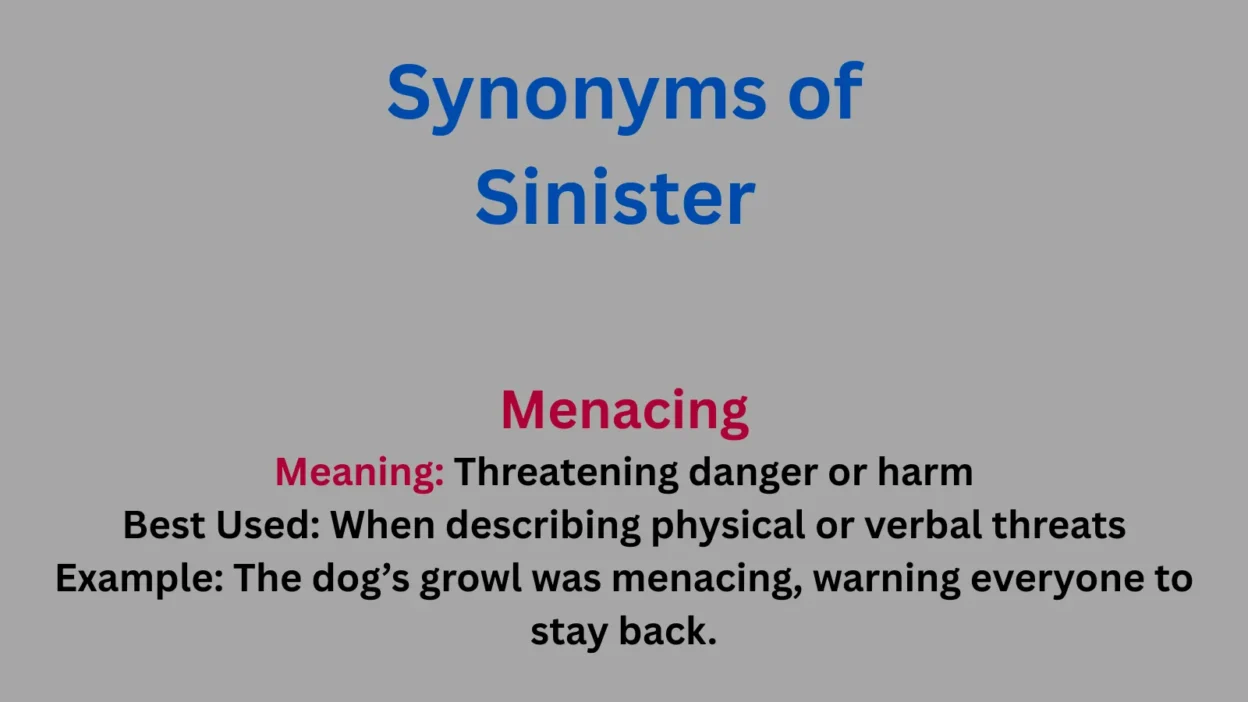“Sinister” is a word that carries a heavy emotional weight. At its core, sinister means something dark, threatening, or suggestive of harm. Synonyms for “sinister often evoke a sense of hidden evil, malice, or ominous intent. In literature, film, or daily language, it can describe anything from a villain’s grin to an eerie silence before a storm.
But there’s more than one way to express this chilling vibe. Whether you’re crafting a suspenseful scene, describing a shady character, or exploring deeper emotional layers, choosing the right synonym can make all the difference.
This guide explores 30 synonyms for “sinister”, helping you understand their unique shades of meaning and when to use each one. You’ll also find examples to spark your usage, plus advice on selecting the most fitting word based on tone, setting, and audience.
30 Synonyms of Sinister – With Meaning, Usage, and Examples
1. Menacing
Meaning: Threatening danger or harm
Best Used: When describing physical or verbal threats
Example: The dog’s growl was menacing, warning everyone to stay back.
2. Ominous
Meaning: Suggesting that something bad is about to happen
Best Used: To foreshadow events
Example: Dark clouds gathered with an ominous silence.
3. Foreboding
Meaning: A sense that something bad will occur
Best Used: In psychological or atmospheric contexts
Example: She felt a foreboding chill as she entered the abandoned house.
4. Threatening
Meaning: Showing an intention to cause harm
Best Used: In both emotional and physical confrontations
Example: His tone turned threatening when questioned.
5. Eerie
Meaning: Strange and frightening
Best Used: For unsettling environments
Example: An eerie silence followed the scream.
6. Grim
Meaning: Harsh, bleak, or unsettling
Best Used: To describe mood or tone
Example: The news came with a grim warning.
7. Creepy
Meaning: Causing unease, especially in a subtle way
Best Used: Informally, for mild but disturbing things
Example: That clown in the basement looks creepy.
8. Malevolent
Meaning: Having evil intentions
Best Used: For people or supernatural forces
Example: His malevolent eyes glinted with hatred.
9. Baleful
Meaning: Expressing harmful intent
Best Used: When you want a poetic or literary flair
Example: The villain cast a baleful glance at his enemy.
10. Malicious
Meaning: Intending to cause pain or harm
Best Used: When behavior or action is intentional
Example: Her malicious gossip destroyed his reputation.
11. Dark
Meaning: Evil, mysterious, or morally wrong
Best Used: Broadly, from mood to character traits
Example: He had a dark past that no one spoke about.
12. Ghoulish
Meaning: Morbid or fascinated with the macabre
Best Used: For characters obsessed with death or gore
Example: His ghoulish laughter echoed through the crypt.
13. Spooky
Meaning: Slightly scary, usually playfully
Best Used: In casual or Halloween-themed contexts
Example: The abandoned house looked spooky at night.
14. Wicked
Meaning: Morally wrong or evil
Best Used: Often lighthearted or fairy-tale-style
Example: The wicked witch cast a powerful curse.
15. Shadowy
Meaning: Mysterious, hard to see or understand
Best Used: For people or intentions that are unclear
Example: A shadowy figure slipped into the alley.
16. Twisted
Meaning: Distorted morally or mentally
Best Used: For disturbing behaviors or people
Example: His twisted sense of humor made others uneasy.
17. Villainous
Meaning: Typical of a villain
Best Used: For exaggerated or dramatic evil
Example: He delivered a villainous monologue, complete with laughter.
18. Unholy
Meaning: Morally wrong or offensive to sacred things
Best Used: In religious or horror settings
Example: An unholy presence lingered in the church.
19. Macabre
Meaning: Gruesome, often related to death
Best Used: In gothic or horror writing
Example: The painting had a macabre beauty.
20. Vile
Meaning: Disgustingly bad or evil
Best Used: To express strong condemnation
Example: That was a vile betrayal of trust.
21. Nefarious
Meaning: Wicked or criminal
Best Used: For secretive and illegal behavior
Example: The detective uncovered a nefarious scheme.
22. Diabolical
Meaning: Devilishly evil
Best Used: For characters or plans that are outrageously wicked
Example: His diabolical plan shocked even his allies.
23. Perilous
Meaning: Full of danger
Best Used: In adventurous or high-stakes scenarios
Example: They went on a perilous journey through the jungle.
24. Horrific
Meaning: Extremely disturbing or terrifying
Best Used: For shocking events
Example: The scene was too horrific to describe.
25. Beastly
Meaning: Brutal or inhuman
Best Used: In dramatic, old-fashioned tones
Example: That was a beastly act of cruelty.
26. Terrifying
Meaning: Inspiring intense fear
Best Used: For immediate, overwhelming danger
Example: The terrifying scream pierced the night.
27. Appalling
Meaning: Shockingly bad
Best Used: For both moral and aesthetic criticism
Example: The conditions were appalling and inhumane.
28. Dreadful
Meaning: Causing fear or great suffering
Best Used: In classic or emotional writing
Example: A dreadful storm ruined the harvest.
29. Morbid
Meaning: Preoccupied with death or the disturbing
Best Used: For people or fascinations
Example: He had a morbid obsession with crime scenes.
30. Ghastly
Meaning: Horrible or ghostlike
Best Used: To describe appearance or events
Example: A ghastly pale figure loomed in the doorway.
How to Choose the Right Synonym for “Sinister”
When choosing a synonym for sinister, consider:
- Emotional Intensity: Use “eerie” or “spooky” for light suspense, but “horrific” or “ghastly” for strong fear.
- Formality and Tone: “Malevolent” and “baleful” sound more literary, while “creepy” and “twisted” are modern and casual.
- Contextual Fit: “Ominous” fits atmospheres, while “villainous” suits characters. “Macabre” adds a gothic flair, and “nefarious” adds criminal tone.
- Cultural Nuances: Some words, like “diabolical” or “unholy,” carry religious or mythic associations. Choose carefully in sensitive settings.
Conclusion: Elevate Your Writing with the Right Word
“Sinister” is just the beginning. The English language offers dozens of alternatives, each with its own mood, tone, and purpose. Whether you’re writing a thriller, describing a disturbing event, or adding depth to a character, the right synonym enhances clarity and emotion.
Think about the emotional weight you want to convey, the audience you’re addressing, and the setting of your story or conversation.
By understanding and using these 30 synonyms, you’ll sharpen your expression, engage your readers, and add layers of meaning to your writing. Let your word choice do the storytelling—and make it unforgettable.




